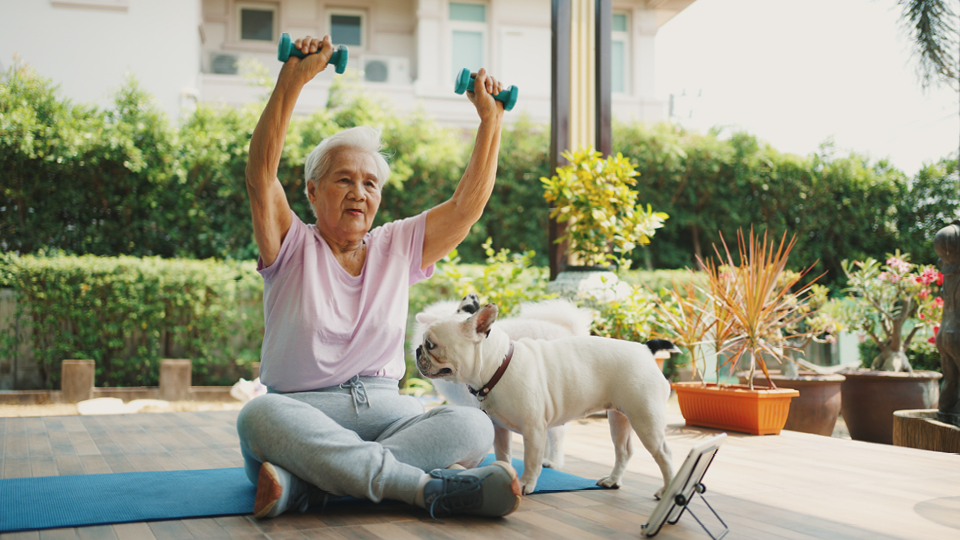
From Okinawa to Sardinia, more people are living for 100 years or more than ever before. Understanding the lifestyle factors shared by centenarians across the globe can help the rest of us enjoy longer, healthier lives, too.
The Centenarian Lifestyle
In any population, people who live to be 100 years or older are very rare, making up less than 1% of most populations globally. However, some geographical regions, known as Blue Zones, have an unusually high proportion of centenarians, which has led researchers to wonder what factors contribute to the exceptionally long and healthy lives of people in these areas. Although advances in medicine have helped this population continue to grow at a rate of 8% per year, better healthcare explains only a small part of these individuals’ extraordinary lives (1). Scientists have pinpointed several key lifestyle factors shared by centenarians across the globe. Understanding their secrets to health and longevity can help the rest of us enjoy better health and perhaps a longer life, too.
Choosing Nutrient-Dense Whole Foods
One of the most asked questions received by people who live for 100 years or more is, “What do you eat?” The answer, however, may not surprise you. The secret to living a long life is not about consuming or avoiding any particular food. Instead, centenarians are known for diets that are balanced, low glycemic, low in saturated fats, and full of nutrient-rich vegetables (3,4). In Blue Zones, the diets are primarily whole-food based and are generally high in complex carbohydrates. Blue Zone cultures consume foods rich in antioxidants and omega-3 fatty acids, such as fish and nuts (2). These healthful diets are linked to reduced mortality from major age-related diseases, including cardiovascular diseases, diabetes, and cancers (3).
Keeping Calories Moderate
One of the most noted and scientifically supported aspects of a centenarian lifestyle is a calorie-controlled diet. In Okinawa, a Blue Zone region in southwestern Japan with one of the highest rates of centenarians on the planet, the population traditionally follows a lower-calorie diet that promotes a leaner body. The nutrient-dense and lower-calorie diets of Okinawans contribute to higher concentrations of plasma DHEA, an important hormone precursor for insulin and stress responses that naturally decrease with age (5). Calorie-restricted diets have also been shown to inhibit mTOR, an enzyme associated with accelerated aging, and promote NAD+ and sirtuin levels for improved energy, metabolism, and longevity (6).
Moving Freely
Since the 1800s, centenarians have reported the importance of a physically active lifestyle (1). Whether walking daily in hilly villages, gardening in their yards, or even working hard into their later years, centenarians keep their bodies moving. Research shows that physical activity stimulates AMPK, an important enzyme in energy homeostasis, and promotes mitochondrial health and longevity (2). Active lifestyles full of outdoor activities have also been associated with decreased reports of depression, strong mental health, and higher life satisfaction amongst centenarians (7).
Staying Social and Having Fun
No healthy body is complete without a healthy mind. Scientists have found that centenarians stay sharp by staying social (8,9). In Sardinia, a Blue Zone located in the Mediterranean, centenarians have noted enjoying an early dinner followed by a glass of wine with their family or friends each night (3). A strong social network, leisure hobbies, and learning new things promote healthy cognitive function and overall happiness, no matter your age in life.
Living to be 100 years old is not about luck. In fact, scientists believe that good genes account for only 25% of your chances at longevity (2). Working hard, eating a moderate and balanced diet, and remembering to have fun along the way make up the majority of factors influencing whether or not you’ll join the growing population of centenarians across the globe.
References
- Venturelli M, Schena F, Richardson RS. The role of exercise capacity in the health and longevity of centenarians. Maturitas. 2012 Oct;73(2):115-20.
- Longo VD, Antebi A, Bartke A, et al. Interventions to Slow Aging in Humans: Are We Ready? Aging Cell. 2015 Aug;14(4):497-510.
- Vasto S, Rizzo C, Caruso C. Centenarians and diet: what they eat in the Western part of Sicily. Immun Ageing. 2012 Apr 23;9(1):10.
- Willcox BJ, Willcox DC, Todoriki H, et al. Caloric restriction, the traditional Okinawan diet, and healthy aging: the diet of the world’s longest-lived people and its potential impact on morbidity and life span. Ann N Y Acad Sci. 2007 Oct;1114:434-55.
- Willcox DC, Willcox BJ, Todoriki H, et al. The Okinawan diet: health implications of a low-calorie, nutrient-dense, antioxidant-rich dietary pattern low in glycemic load. J Am Coll Nutr. 2009 Aug;28 Suppl:500S-516S.
- Dakic T, Jevdjovic T, Vujovic P, Mladenovic A. The Less We Eat, the Longer We Live: Can Caloric Restriction Help Us Become Centenarians? Int J Mol Sci. 2022 Jun 11;23(12):6546.
- Fastame MC. Well-being, food habits, and lifestyle for longevity. Preliminary evidence from the sardinian centenarians and long-lived people of the Blue Zone. Psychol Health Med. 2022 Mar;27(3):728-733.
- Barak Y, Leitch S, Glue P. The Great Escape. Centenarians’ exceptional health. Aging Clin Exp Res. 2021 Mar;33(3):513-520.
- Csaba G. Immunity and longevity. Acta Microbiol Immunol Hung. 2019 Mar 1;66(1):1-17.
The post How to Age Like a Centenarian appeared first on Isagenix Health.
Source: IsagenixHealth.net